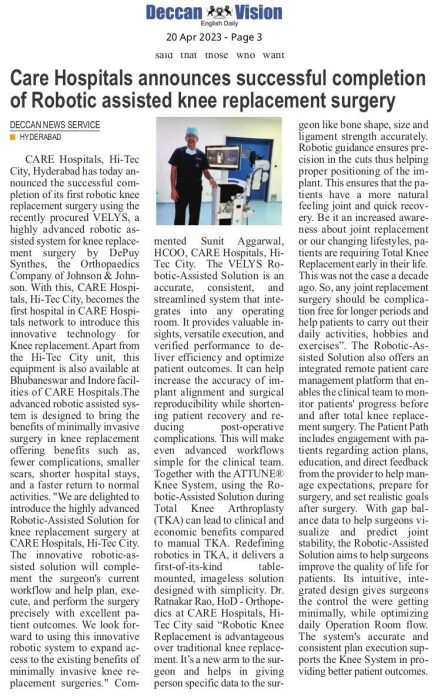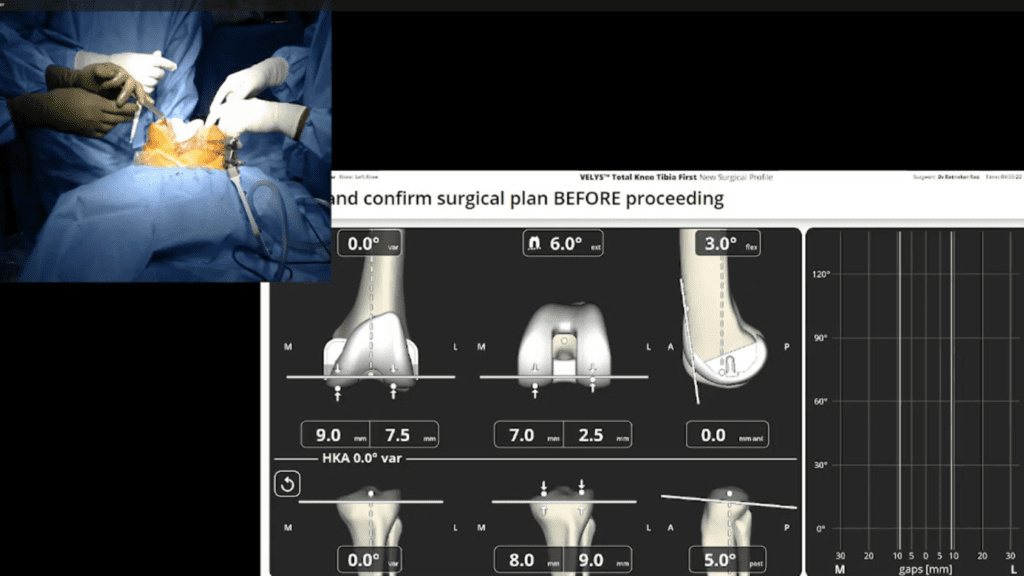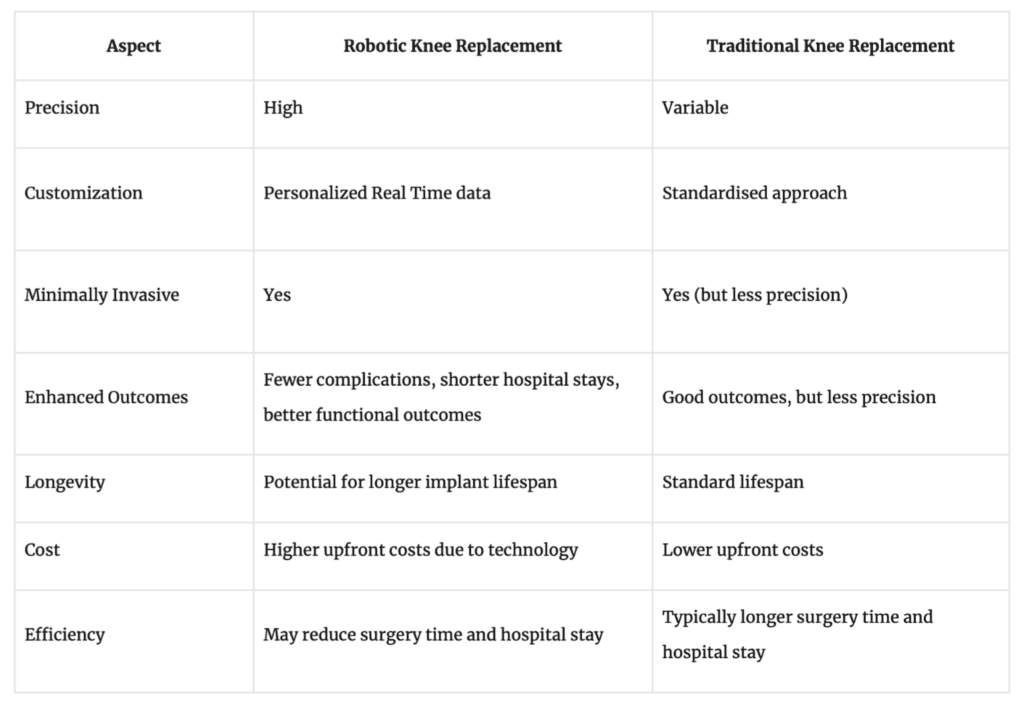Robotic Knee Replacement: Revolutionizing Orthopedic Surgery
by Impact Ortho Center | Mar 6, 2024 | Robotic Knee Replacement | 0 comments
In recent years, advancements in medical technology have led to remarkable improvements in orthopedic surgeries, particularly knee replacement. Among these advancements, robotic-assisted knee replacement surgery has emerged as a game-changer, offering unparalleled precision, customization, and improved patient outcomes.
What is Knee Replacement Surgery?
Knee replacement surgery, or knee arthroplasty, is usually performed to relieve pain and restore function in patients who suffer with severe knee arthritis or injury. Traditionally, surgeons have conducted this surgery manually, relying on their skill and experience to accurately align and position the implants. However, with the introduction of robotic technology, the landscape of knee replacement surgery has undergone a significant transformation.
What is Robotic Knee Replacement Surgery?
Robotic knee replacement involves integrating robotic systems into the surgical process to assist surgeons in planning and executing the procedure with unparalleled accuracy and precision. These robotic systems utilize advanced imaging techniques and sophisticated algorithms to create patient-specific 3D models of the knee joint, enabling surgeons to customize the surgery based on the patient’s unique anatomy.

During the Robotic Knee Repalcement Surgery, the robotic arm provides live feedback for the surgeons to perform the surgery with precision thus ensuring the right measurements are followed and exactly enough of the damaged bone is removed and right measurements are made for the implants to fit in so they all work together smoothly.

At Impact Orthopedic Center, Care Hospitals, Hyderabad, we acquired VELYS™ Robotic-Assisted technology. As part of preparation for the surgery, first a proper scan is done before the surgery to plan precisely how much bone should be removed and to maximize the accuracy of the alignment and placement of the implant in the knee.
In the year of 2023, after the arrival of Robotic assisted technology, Impact Orthopedic center has niched the Knee replacement surgery with more than 100+ Robotic Knee Repalcement surgeries in just 10 months span. Dr.Ratnakar Rao, Chief Orthopedic Surgeon and his team have performed many surgeries, making peoples live easier and better and thrive to do so .
Benefits of Robotic Knee Replacement
- Precision: Robotic systems provide real-time feedback and assistance to surgeons, allowing for precise bone cuts, implant positioning, and soft tissue balancing.
- Customization: By creating a personalized surgical plan based on each patient’s anatomy, robotic-assisted surgery ensures the best fit and alignment of implants, improving function and longevity.
- Minimally Invasive: Robotic technology enables surgeons to perform the procedure through smaller incisions, resulting in less tissue trauma, reduced pain, and faster recovery times.
- Enhanced Outcomes: Studies have shown that robotic knee replacement patients experience fewer complications, shorter hospital stays, and better functional outcomes than traditional knee replacement surgery.
- Longevity: With precise alignment and right implant positioning, robotic-assisted knee replacements have the potential to last longer and reduce the need for revision replacement surgeries.
Robotic Knee Replacement Surgery Process
- Preoperative Planning : This Robotic device is a fourth generation and it does’nt require MRI and CT scan or a 3D model because it takes real time data.
- Intraoperative Navigation: During the robotic knee repalcement surgery, the robotic system assists the surgeon in executing the preoperative plan obtained by providing real-time feedback and guidance. The surgeon removes damaged bone and prepares the joint for implantation using specialized instruments.
- Implant Placement: With the assistance of the robotic system, the surgeon accurately positions the implants within the joint, ensuring optimal fit, alignment, and stability. The robotic technology helps achieve proper soft tissue balancing, crucial for restoring natural knee function.
Postoperative Care: Following surgery, patients undergo rehabilitation and physiotherapy to regain strength, mobility, and function. The minimally invasive nature of robotic-assisted surgery facilitates faster recovery and earlier return to daily activities.

Comparison: Robotic vs. Traditional Knee Replacement

A note from Impact Orthopedic Center:
Robotic knee replacement represents a significant advancement in orthopedic surgery, offering patients personalized care, improved outcomes, and enhanced longevity of implants. We use Attune Knee Implants, one of the largest research and development projects of Depuy synthes (JOHNSON AND JOHNSON). It combines the latest design, kinematics, material, and engineering to improve stability and motion.
As the field continues to evolve, it is expected that robotic technology will become increasingly integrated into orthopedic practice, further optimizing patient outcomes and quality of life.
FREQUENTLY ASKED QUESTIONS
Robotic knee replacement surgery offers several advantages over traditional methods, including enhanced precision, personalized surgical planning, and potentially faster recovery times. This precision can lead to improved outcomes and longevity of the implant, making robotic surgery a preferred option for many patients.
Recovery time for robotic knee replacement surgery can vary depending on individual factors such as overall health, extent of surgery, and adherence to rehabilitation protocols. However, patients often experience shorter recovery times compared to traditional knee replacement surgery, with many able to resume normal activities within weeks to months after the procedure.
The cost of robotic knee replacement surgery can vary depending on factors such as the hospital or surgical center, the surgeon’s fees. Generally, robotic knee replacement may have higher upfront costs compared to traditional surgery due to the use of advanced technology.
Robotic knee replacement surgery typically involves less tissue trauma and more precise implant placement compared to traditional surgery. This may result in reduced post-operative pain for some patients, although pain management strategies are still utilized to ensure patient comfort during recovery.
Robotic knee surgery is considered safe when performed by experienced surgeons in appropriate surgical settings. Like any surgical procedure, there are potential risks and complications associated with robotic knee replacement, including infection, blood clots, and implant-related issues. However, the use of robotic technology may help minimize these risks by improving surgical precision and accuracy.
The success rate of robotic knee surgery is generally high, with many patients experiencing improved function, reduced pain, and enhanced quality of life following the procedure. Success rates may vary depending on factors such as patient selection, surgeon experience, and adherence to post-operative care guidelines.
At Impact Orthopedic Center, we take pride in being at the forefront of orthopedic innovation, offering cutting-edge treatments such as robotic knee replacement. Our team of the best knee replacement surgeons in Hyderabad combines expertise with state-of-the-art technology to deliver best results to our patients. Through our commitment to excellence, we have earned a reputation for transforming lives, making them pain-free, easier, and healthier. Book an appointment today for all your queries and concerns regarding robotic knee replacement surgery and other joint or ortho related issues.
